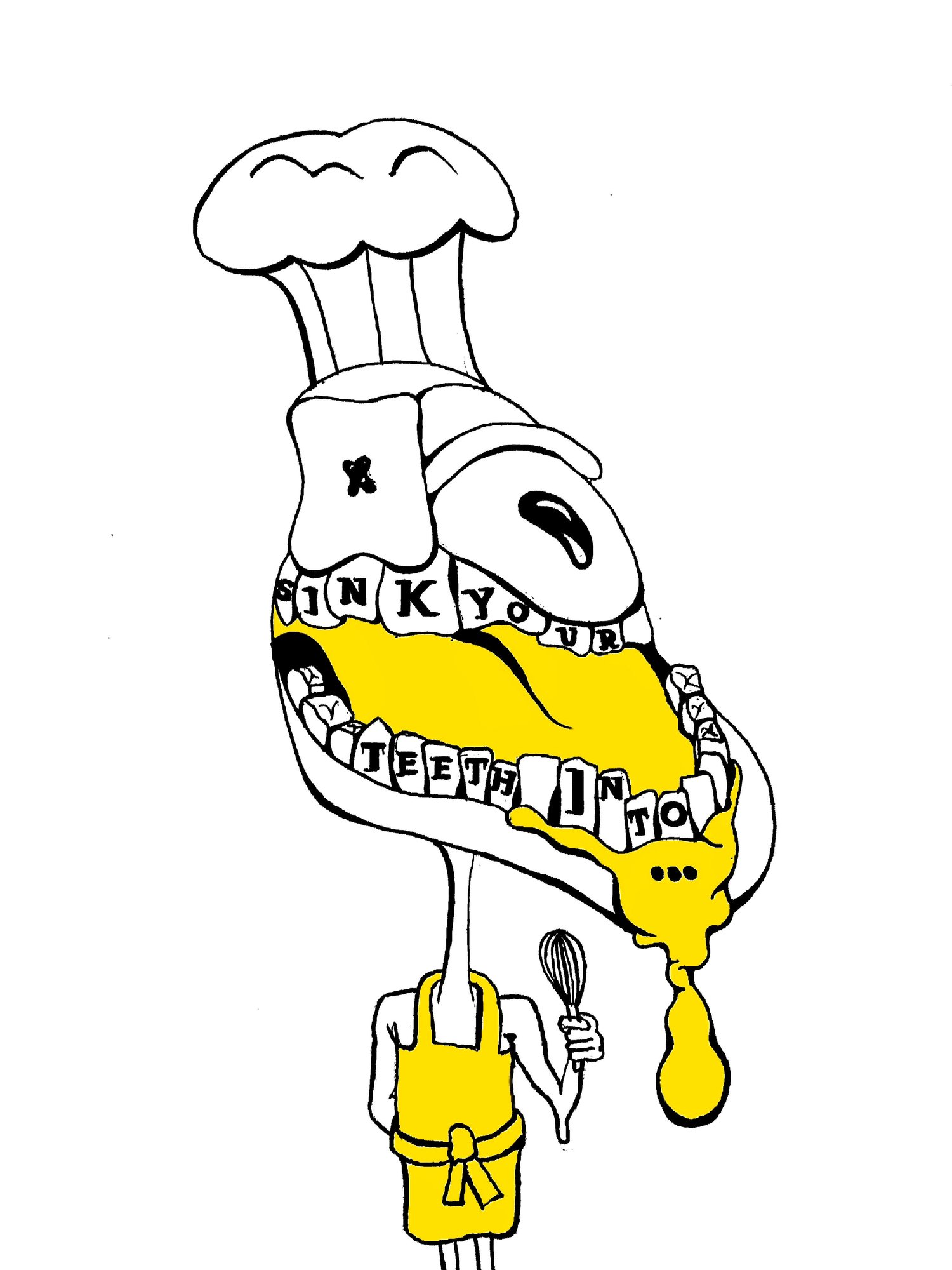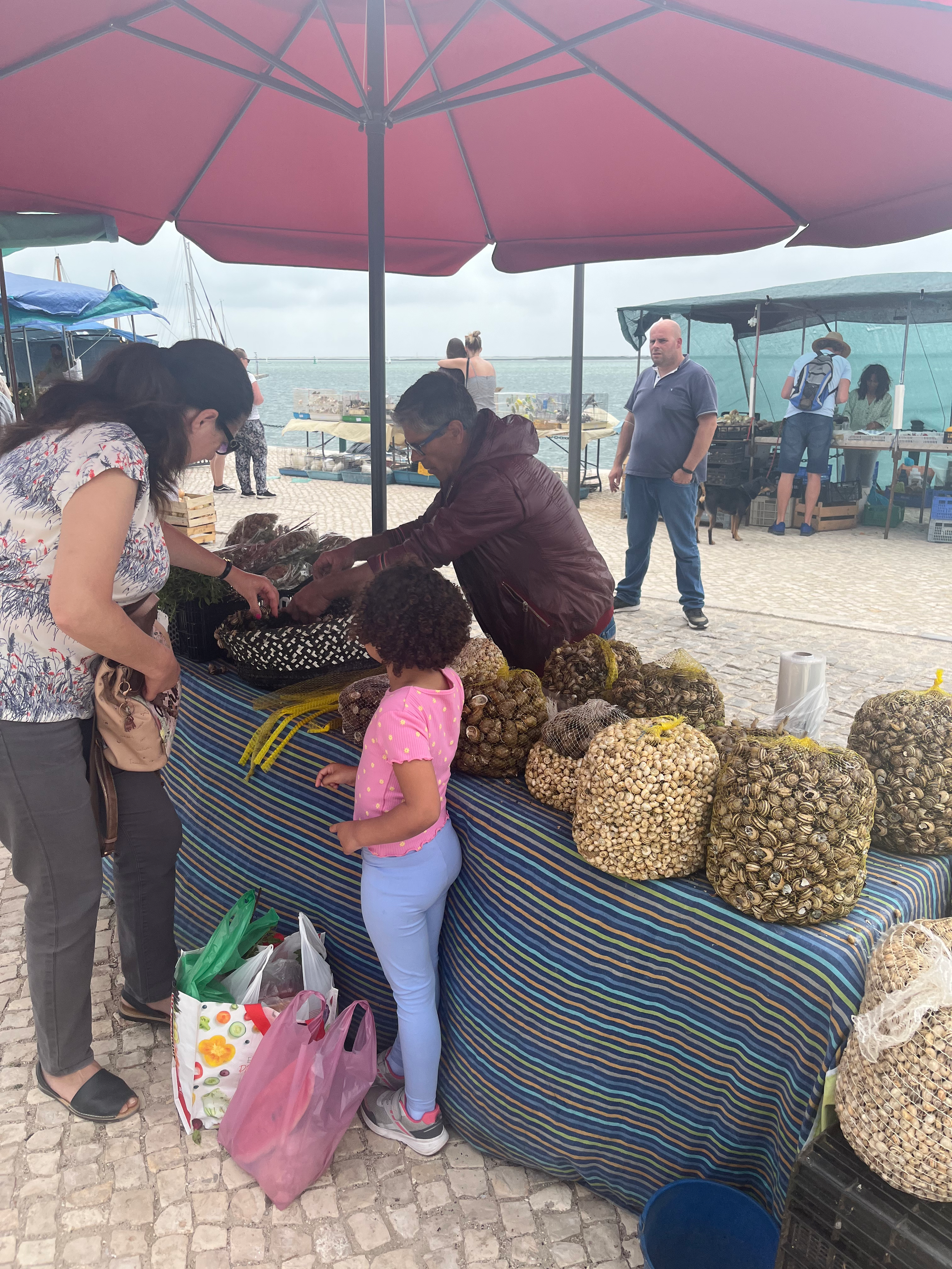Olhão
At lunchtime in Olhão, a fishing village in the Algarve, a loud group crowd shoulder to shoulder around a fold away table in the road. A man emerges from the front door with a bottle, eager to re-join the clamour of boisterous chat. It’s casual, organic and spontaneous in a way that makes the tableau impossible to recreate in any restaurant, no matter how quaint their outside dining area. Amidst the peeling paint and light rubble at the diner’s feet, bougainvillea creeping up and away from the neighbour’s wall accidentally frame a rugged scene as fine art.
I later find out that the owner of this house and its attached purple flowers is an English restauranteur, Kevin Gould. In hindsight, this is rather poetic as Kevin’s niche seems to be framing life’s most unassuming moments as the most extraordinary. He was not just a grocer, but a grocer who pioneered the importing of quality, whole produce to London in the 90s. Before him you could only buy olive oil in Boots, and it was for your ear, he says. This business evolved into a catering company, not any old catering company but a catering company that fed David Bowie and Nigella. Training in kitchens around Europe, he was not just a cook, but once upon a time a personal cook for Ronnie Wood, landing him a spin on tour with the Rolling Stones. He didn’t just travel for work but wrote of his adventures of food and people in The Guardian. Pre Brexit Britain appears to have been kind to Kevin. Perhaps, a man blessed with man-ness in the right place and time. But mostly a person with charm, an infectious zest for life and heartening interest in people other than himself. It is no wonder he “made it” , in London terms. And so, I wonder, why has later life brought him to set up restaurant and home in Olhão?
My close personal friend and confidant, Kevin.
His friends in Lisbon had similar thoughts. Kevin recounts cautionary tales of a smelly town with a reputation for prostitution, piracy, drugs and the catch-all warning of, “they will shoot you in your bed!!!”. True, the islands shielding Olhão, accessible to sunbathers via a square, stolid ferry that chugs steadily from bay to bay, also make something of a smuggler’s paradise. “This is where the good middle class people of Faro used to come get high and meet someone,” says Kevin. Sitting in the cool shelter of the converted brothel that is Gould’s restaurant, Chá Chá Chá, the remark has added weight.
Outside at Chá Chá Chá
Yet far more tantalising pleasures are hidden by the shores. Being a port-town, the seafood is second to none. The tuna is so exceptional that it could and has been sent to Tokyo to sell in Tsukiji market. But here the leftover tails provide sushi-grade flesh that ends up in the inconspicuous and stupidly delicious tuna mayonnaise on Kevin’s ever-changing menu. This, along with a high-camp prawn cocktail, were kitsch English touches on an otherwise local menu. Clams, which I had brothy and garlicy with chickpeas and courgette, were harvested metres away. They are the prize of backbreaking farming on hidden communes revealed only when the sea retreats. The fishermen that farm the same plots for generations with cold feet and baking backs are stoic, local heroes. Kevin stops every 30 seconds to chat with them in the street in excited Portuguese as we walk around town.
One extended greeting happens in a cloud of smoke. The road’s tall, curving house fronts contain the hot smell of charring fat coming from the repurposed burning oil drum, silver mackerels balanced on a make-shift grate. Lunch is early but then again, the grillers have been up since before dawn, feeling the sea for robalo. Now is the time to be with mates at the pigeon racing society, kind of like a working mans club except you also race pigeons. Its open doors reveal cracked floors, dim light, empty tables and no women. Its accidental minimalism is calm and cool in Olhão’s, hot, winding closeness. They congregate around the blackening fish by the back door stoop. The men chat loosely and casually to Kevin, a closeness probably owed to the reliable and uncomplicated business Chá Chá Chá creates for local farmers and producers. Kevin likes the tangible, analogue cash in hand trade between producer and buyer that is the norm in Olhão. But then again, what chef wouldn’t? The dinner service I find myself at sees Kevin depositing tangerines at the place settings of every diner like a happy easter bunny on a health kick. What inspired him to do that? “We had nice tangerines in.” With such an abundance of quality ingredients, Kevin can be generous in a way he could never be working in the London hospitality industry, where items are costed to the half penny.
He is keen for me to see the abundance myself at the Saturday market. It springs up weekly on the waterfront selling mounds of produce from the nearby hills. The snail seller is mesmerising; sacks of shells with green slimes sprawling out from them, reaching through the holes of the net bags, escaping down table legs. He scoops the molluscs up with a tin mug like they’re dried chickpeas, decanting them into shopping bags. There are hidden Ostrich eggs, parrots in cages, frying donuts. The stalls have a Tim Burton whimsy that makes it different to any other European market I’ve been to. Un-trying in its charm, knowing in its dark eccentricity.
Olhão has an independent spirit forged not only by its geography (its as close to Tangier as it is to Lisbon) but also as a response to derogatory finger pointing and snide remarks by the rest of Portugal. Such judgement from inland is met only with cool acceptance. Kevin is adamant that although public perception is right that the people here are tough, they are not dangerous. I thought of earlier, when a winding alley ended up funnelling me toward a gaunt, topless man happily talking to himself. He must have sensed my tention, prompting him to let out a shrill squawk, millimetres from my face, as we passed each other. He cracked up all the way to the beach, at the ridiculous notion that he would have left me anything other than unscathed, and at the kind of prejudiced tourism that taught me otherwise. They know their perception says more about you than them.
In Olhão, the city church is flat against the still, boundless sky. People inPortugal will say that Olhâo houses bad Christians, a scathing charge considering Catholicism’s historic prevalence in the country, only formally separated from the state in 1974. But in a sense they are right, you get the impression the locals won’t take a shining to an outsider telling them what to do, even the Ultimate Authority. If there is God in Olhão, it’s in the sea, the surrounding hills, the leathery faces of smiling fisherman, the tides that set the rhythm of the place. In the Church square, your eye is drawn upward not by the building’s majesty but by a Stork’s nest precariously balanced on its gable. The mother stork’s sharp silhouette as portentous against the sun as the crucifix its perched on.
So what’s Kevin doing here? He is not the only one making good food. There is a grandmother rendering chickens over open coals at Frango de Cidade until their salty skins shatter with the touch of a fork. There are whole sardines and vinegary tomato salads that leave oil stains on paper tablecloths. Buy a sack of prawns, some garlic and lemon on your way home from the beach and you’re laughing. Yes, not everywhere is doing kombucha apperitivos, natural wine and “small plates” (the latter two at least, not so intentionally) like Chá Chá Chá is. But spend a day eating in Olhão and you’ll realise these trendy bits aren’t nearly as important to you as urban life had you believe. Olhão - its sea, its soil, its feisty character - is so rich, that the good food is incidental. Its presence is as effortless and relaxed as the people of the town. Kevin swims entirely with this tide, keeping his English touches but ultimately, showcasing the people, the produce and the traditions of a town he is proud to call home. There was good eating in Olhão before Kevin and there would be good eating without. But Kevin’s enthusiasm for the place has allowed him to carve out a unique role for himself. His adoration of Olhão prompts the comers and goers like me to stop, look, and see mounds of strawberries that never end, sea beds crammed with clams or content locals eating in the road as truly, perfectly, beautiful.






